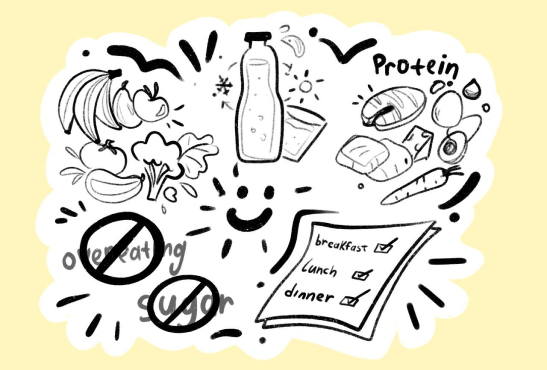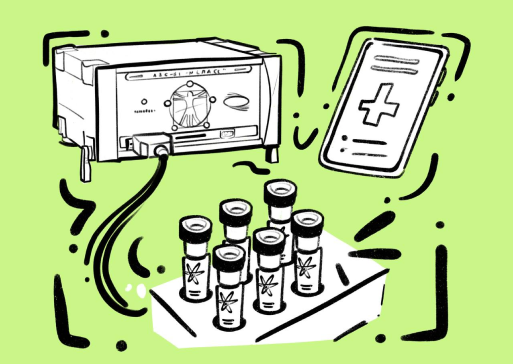How to know if your food drains your vital energy
There’s a saying: “If it’s good enough to eat, it must be healthy.” But is that really the case? Can we consider every product healthy just because we enjoy eating it?
Of course not. A variety of substitutes, colorants, and food additives have dulled the sharp sensitivity of our taste buds, forming a food dependency. Numerous studies confuse the public with unfamiliar terms and statements, convincing us of the benefits and safety of trendy substitutes that are increasingly being used today. When did it become normal to promote certain types of food? We could debate this for a long time, but what’s the point if we are currently powerless to influence the production and removal of pseudo-foods from the market?
It’s important to remember that the food we eat is fuel, influencing our level of life energy — either maintaining or depleting it, not just throughout the day but in the long term. Our body is like a large furnace, fuelled by dry firewood — it lights up quickly, easily sustains the burning process, and releases heat. But if you throw in damp wood, or worse, fuel it with materials not designed to burn for long, you’ll constantly struggle to keep the fire going and deal with the consequences of improper fuelling.
The same happens with our body: when we consume food that doesn’t suit us, we lose energy instead of replenishing it. Later, we will also need to rid the body of harmful, destructive elements.
Replenishing energy reserves occurs only when the food consumed has the right nutritional value for the body. Only in this case will there be enough vital energy to face everyday tasks of varying complexity, and changes won’t be intimidating in their unpredictability.
Sometimes, to restore energy, we increase the amount of food we eat, but a Harvard University study, which followed the health of more than one hundred thousand people over twenty years, proved that the quality of what we eat is much more important than the quantity.
While some are trying to change the current state of nutrition, others are learning to “read” their bodies, paying attention to how they react to different foods, and determining on their own which foods their body gratefully accepts and which it categorically rejects.
Today, there are two ways to solve the problem of identifying the benefits or harm of food for our body — through life experience and technical analysis. Which path to explore first is up to you.
You can check whether the food you’ve eaten has benefited your body in a few simple ways:
If you feel energetic and alert, it could indicate that the food was nutritious and will likely be well-digested. However, if you experience stomach pain, bloating, heartburn, diarrhea, or constipation, it’s time to seriously reconsider your diet.
Here are a few basic dietary guidelines to help you start feeling good after meals:
1. Eat more vegetables and fruits. They contain the highest amount of natural vitamins and minerals, which are better absorbed than any supplements.
2. Drink more fluids year-round. Adequate hydration improves lymphatic system function, helping to flush out harmful substances from the body.
3. Increase your intake of protein-rich foods. Protein is the building block of our body. Protein-rich foods promote the rapid repair and regeneration of cells.
4. Avoid overeating and reduce sugar intake. Both can drain your energy.
5. Maintain a regular eating schedule. This helps your body stop fearing prolonged hunger.
When you consume the right foods for your body, your skin improves, your weight stays balanced, and your digestion works like clockwork. However, if you experience an allergic reaction, rashes, redness, or itching, these are serious symptoms indicating that the food you’ve eaten is harming your health.
Note: Immunity is 80% dependent on gut health. Everything we eat either strengthens or weakens our immune system. Ideally, half of your daily diet should consist of plant-based foods, as they are excellent immune system boosters.
On the other hand, an excess of refined sugar suppresses the nervous system and reduces the activity of antibodies, which are responsible for fighting infections. An increased susceptibility to infections may indicate that there are foods in your diet that don’t suit your body. The sooner you reassess your diet, the more benefit you’ll bring to yourself.
Note: If you feel fatigue and weakness after eating, it may be related to a disruption in carbohydrate metabolism. This occurs when a person consumes a lot of simple carbohydrates such as bread, pastries, sweets, and sugary drinks. A sharp spike in blood sugar leads to insulin resistance, which causes weakness. A large meal is also hard for the body to digest. This happens because the parasympathetic nervous system, responsible for self-regulation, kicks in. During this process, there is a significant blood flow to the digestive organs, resulting in a lack of oxygen to other systems, particularly the brain, causing feelings of weakness and drowsiness.
If you feel an energy boost right after eating, or at least maintain your previous energy level, it means you’ve chosen foods that are beneficial for you. However, if you feel tired, weak, and drained after a heavy meal, it’s likely that those foods don’t suit your body, and you should avoid including them in your diet next time.
The right diet for you improves your mood and reduces the risk of diseases related to depression and anxiety. It’s important to know how to properly regulate and combine foods for this purpose. Food that neither benefits you nor brings you pleasure inevitably leads to a decline in mood. On the other hand, food eaten with joy that leaves you feeling light will improve your mood and increase your overall happiness.
Note: A person’s emotions and mood are directly linked to substances produced by the body, including those derived from the nutrients we consume. A deficiency in essential vitamins and minerals, which are most easily absorbed from food, can lead to low energy levels and, consequently, a bad mood. Therefore, if after eating you maintain a good mood for a long time, it means you’ve found the right diet. If it’s the opposite, pay attention, as scientific research has proven that an uncomfortable diet can lead to depression, irritability, and various mental disorders.
Nutrition is undoubtedly important for the body, but it plays an equally crucial role for the brain. The brain’s activity and cognitive abilities depend on the nutrition it receives.
Note: Every meal and its composition will affect the brain differently. Nutrients are responsible for boosting neurotransmitter levels. With the right diet, a person can think and reason easily, maintain good memory and concentration, and even improve other cognitive abilities. Scientific studies have shown that fast food has a highly negative effect on the formation of neural connections in the brain, as does low-quality food filled with chemicals. If your diet lacks quality, cognitive impairments will inevitably be negatively influenced.

Various tests to assess the balance of nutrients in the body and overall body condition are gaining popularity and becoming more accessible. There’s no longer a need to visit multiple doctors and undergo numerous tests to understand the state of your health. Different testing methods can help address concerns quickly and easily. For example:
Functional Tests. Modern technologies offer incredible capabilities and innovations, and they haven’t bypassed the fields of nutrition and dietetics. One such innovation is the body composition analyser known as bioimpedance analysis.
This device easily determines the amount of fat and muscle mass in the body, as well as fluid content and your ideal weight parameters. Bioimpedance analysis is based on measuring bioimpedance, the resistance of biological tissues. Each tissue in the body has its own level of resistance, and the body analyser measures it by sending a weak electrical current through the body, making the procedure entirely painless.
Bioimpedance analysis helps track:
· The amount of fat tissue (not water);
· An increase in intracellular and extracellular fluid, found in the blood and lymph (hidden edema);
· A reduction in fluid volume, indicating dehydration;
· The amount of active cellular mass. A deficiency in cellular mass leads to fat accumulation, even with a low-calorie diet;
· Your individual ideal body weight and basal metabolic rate.
Mobile Applications. Mobile healthcare is a relatively recent development, but it now enables the creation of electronic platforms for communication with doctors. Mobile apps help analyse consumed foods and understand their effects on the body based on the data entered. These platforms are usually developed with input from dieticians and provide a comprehensive database of food information.
Almost every smartphone has apps that count calories, proteins, fats, and carbohydrates. These apps generate daily reports that show users their weight trends, calorie intake, and a summary of their diet. Besides the ratio of fats, carbohydrates, and proteins, users can also see the amount of sodium and other micronutrients in milligrams. Most apps also include a barcode scanner for products bought in stores. With this feature, users have the option to set a daily food consumption limit, which is quite convenient for tracking calorie intake.
Apps that function like food diaries help users analyse their diet and understand which meals or snacks throughout the day are most likely contributing to weight gain. A person may think they aren’t eating “anything bad,” but the issue could lie in portion sizes, how the food is prepared, or in overlooked snacks. When an app tracks meals and records the data, it becomes easier to identify the cause of weight gain or a plateau in weight loss. Additionally, these apps automatically calculate the calorie content of meals, making it easier to visualise dietary analysis.
However, despite the obvious advantages, there are downsides. According to doctors, people who use such apps don’t develop healthy eating habits. Healthy eating works for them only while the app is installed. Moreover, constant calorie counting leads to strict restrictions, often followed by binge eating. People also tend to confuse calorie intake with satiety.
Biomarkers. Biomarkers are substances whose presence in the body can indicate normal or pathological conditions, the risk of developing certain diseases, or the level or deficiency of beneficial substances in the body. Special blood tests for biomarkers help detect levels of vitamins, minerals, and hormones, and show how food impacts your health and what consequences it may lead to.
Genetic tests help analyse an individual’s genetic predisposition to specific bodily reactions to food. Genetic testing helps select the type of diet that best suits the unique features of your body. However, there is some debate on this. Some scientists argue that genetic testing does not provide fully reliable information, as factors like the environment and stress levels can influence results and distort the findings. Nonetheless, these studies are generally considered positive and are widely used in dietetics and preventive medicine.

Your thought is a big bang of ideas. Our journal is its source.
Thank you!




